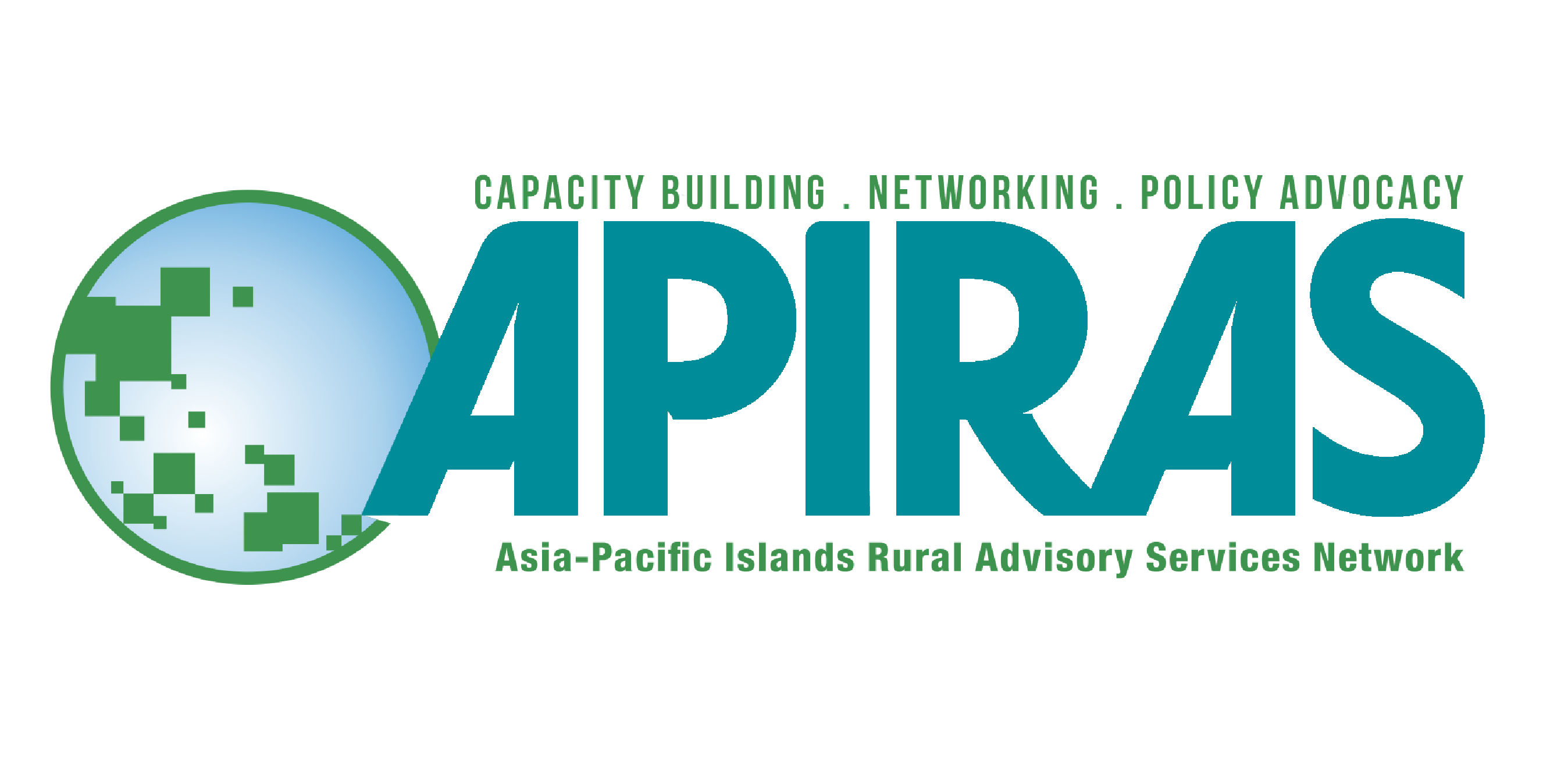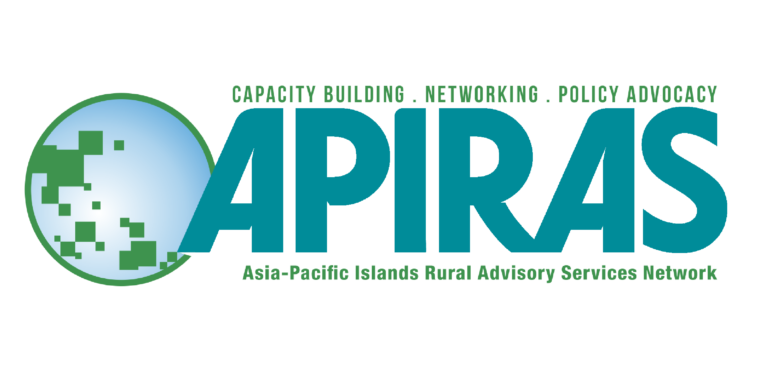EVENTS
Third Meeting of the Working Group on Agroecology, (APIRAS-APAARI-FAO-TAP-AIS) Mainstreaming Agroecology in Agricultural Education
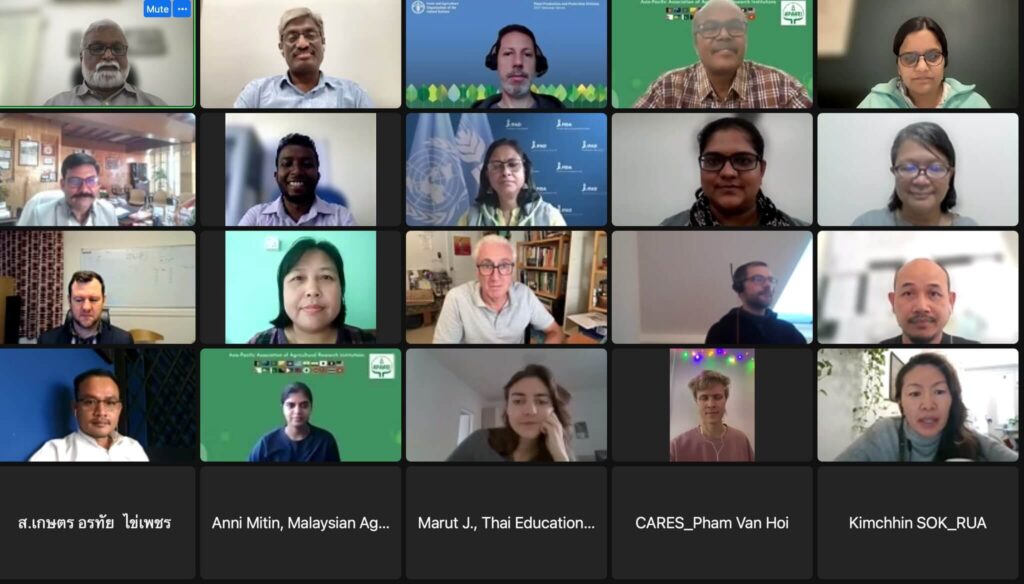
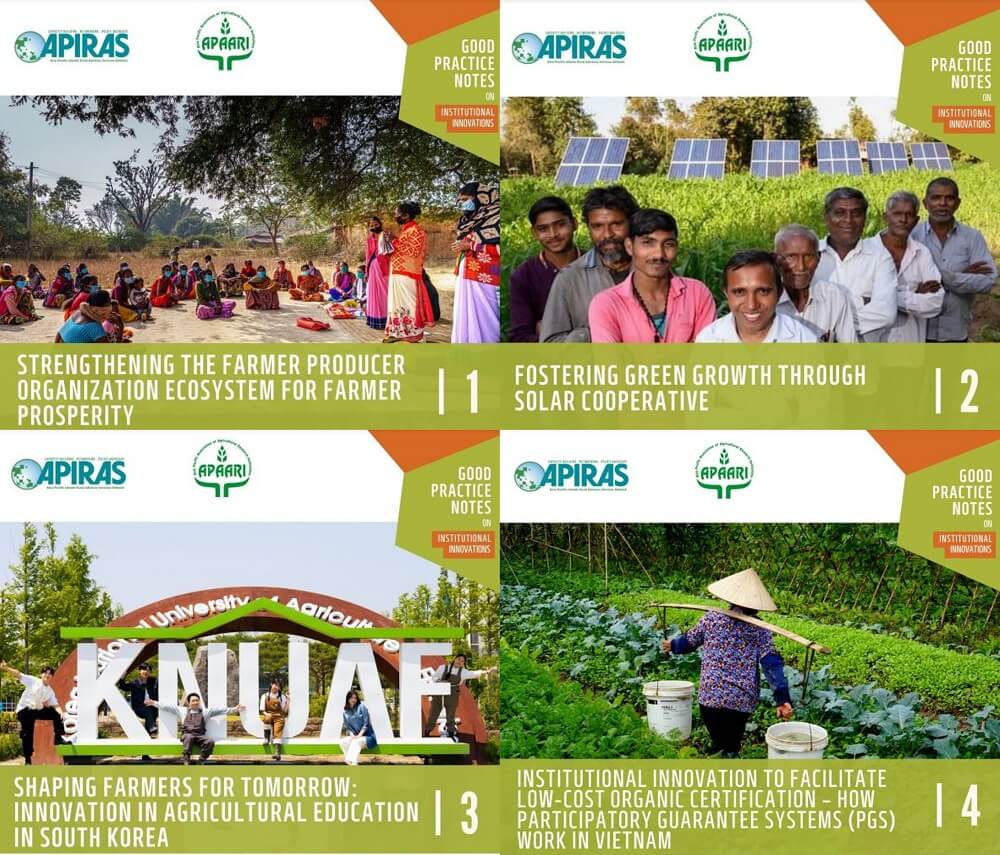
APIRAS-APAARI-Good Practices Notes
The Asia-Pacific Islands Rural Advisory Services Network (APIRAS) and the Asia Pacific Association of Agricultural Research Institutions (APAARI), in close collaboration with the Office of Innovation (OIN) at the Food and Agriculture Organization (FAO) of the United Nations, are committed to strengthening agriculture innovation systems (AIS) in the Asia-Pacific for the sustainable transformation of agrifood systems. The Tropical Agriculture Platform (TAP) hosted by FAO, has developed approaches and tools to strengthen innovation capacities in the agri-food sector. As part of the TAP-AIS project funded by the European Union, TAP and its partners aim to strengthen capacities in regional research and extension organizations to integrate TAP tools and approaches into their work programmes. This effort will promote innovation processes at the country level and facilitate and strengthen collaboration and synergies between research and extension organizations at regional and national levels.
Despite encouraging signs that AIS approaches are being more widely integrated into national innovation policies and programmes, their successful adoption remains a challenge, long with limited documentation and evidence of existing successful practices. Considering the growing recognition of the importance of institutional innovations in promoting more efficient and productive collaboration and knowledge flow among different actors in the AIS, the APIRAS, APAARI and OIN-FAO team published the following GPNs considering cases from Asia-Pacific through a joint call.
Training Programme on Multistakeholder Policy Engagment in Agrifood Systems organised by FAO (TAP-AIS), APIRAS and APAARI (18-20 September 2023)
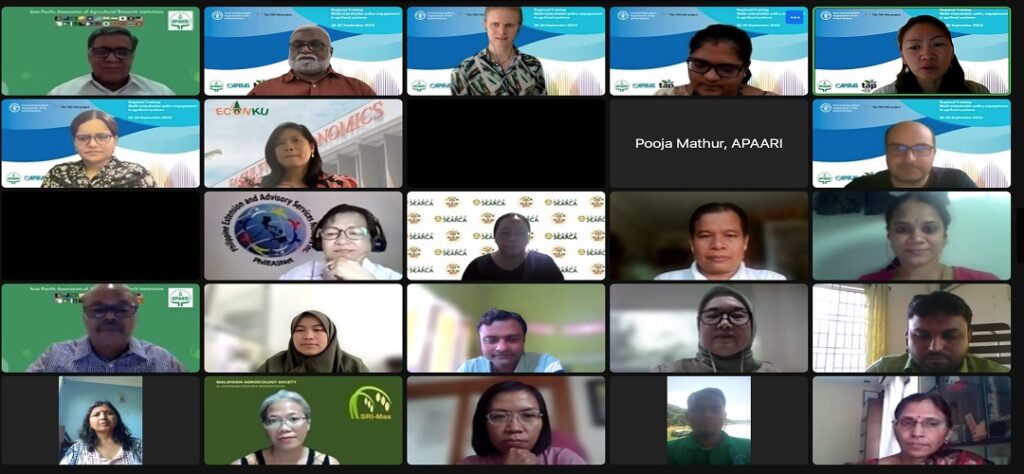
In this second online meeting of the Working Group held today (18 July 2023), the participants reflected on ways to enhance functional capacities in agricultural education in the context of agroecology. To promote agroecology at scale, there is a need to have more professionals who can understand, appreciate, adapt and promote agroecological principles to suit varied agroecological settings. 21 participants representing different organisations interested and involved in development of courses on agroecology participated in the meeting.
Second Meeting of the Working Group on Agroecology, (APIRAS-APAARI-FAO-TAP-AIS) Mainstreaming Agroecology in Agricultural Education
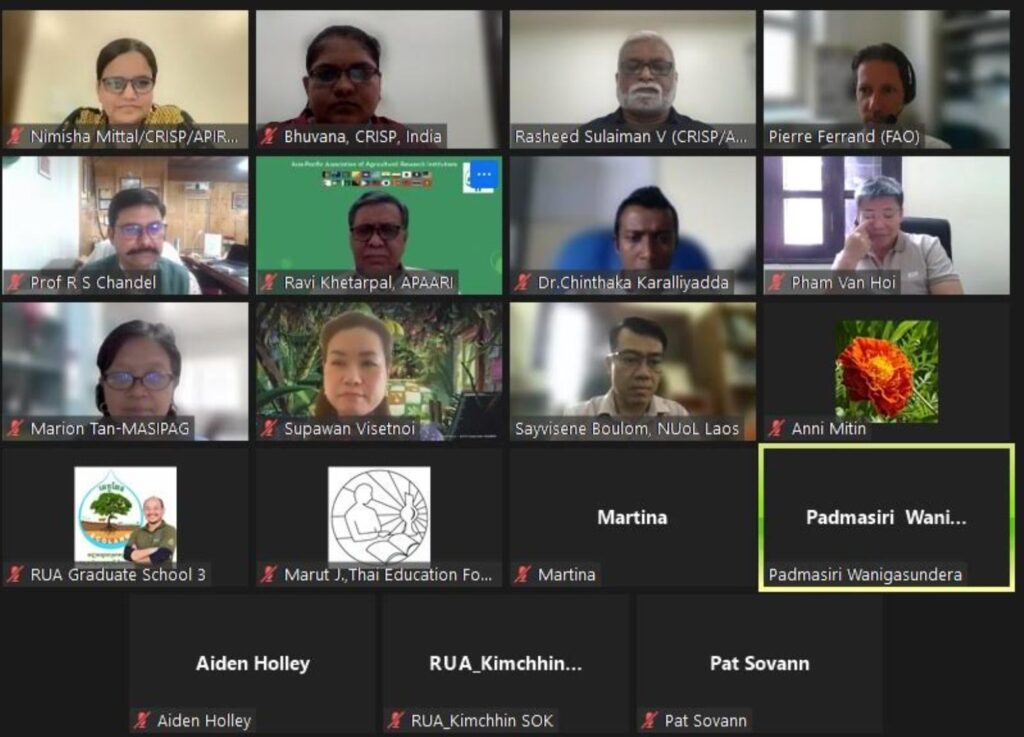
In this second online meeting of the Working Group held today (18 July 2023), the participants reflected on ways to enhance functional capacities in agricultural education in the context of agroecology. To promote agroecology at scale, there is a need to have more professionals who can understand, appreciate, adapt and promote agroecological principles to suit varied agroecological settings. 21 participants representing different organisations interested and involved in development of courses on agroecology participated in the meeting.
APIRAS Learning Workshop, Strengthening Rural Advisory Services in the Asia-Pacific, Bangkok 24-26 January, 2023
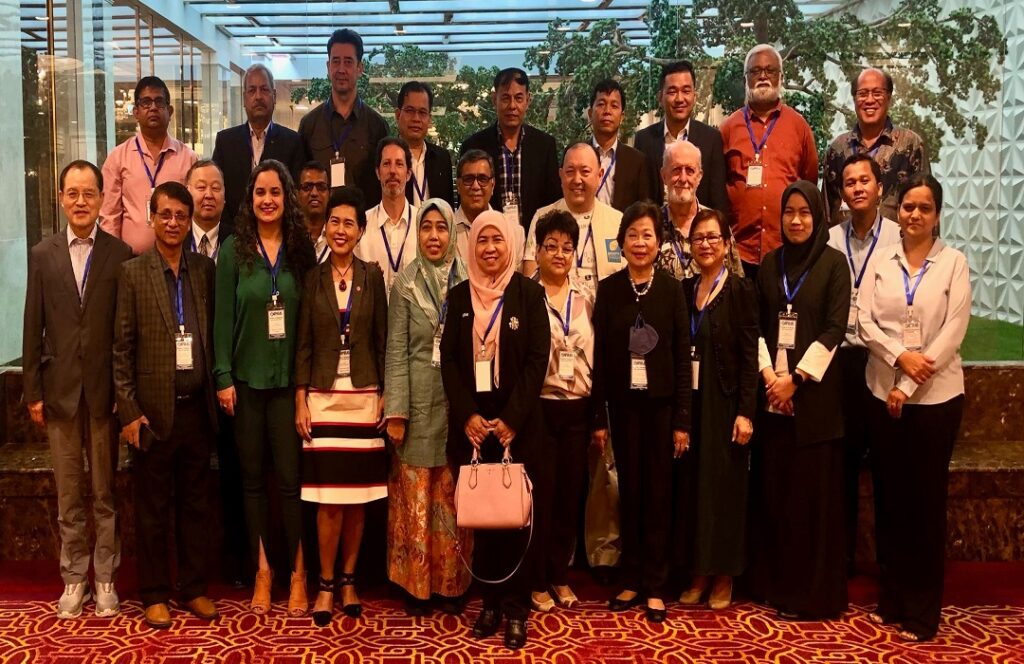
The workshop was aimed at primarily supporting the representatives of the Country Extension Networks to know more about the activities of Asia Pacific Islands Rural Advisory Services (APIRAS) and its sub-regional networks and to help them learn about potential opportunities and interventions to strengthen their initiatives and plan the next set of interventions. The workshop also discussed ways of improving the governance of APIRAS and identifying new hosting arrangements.
IFAD supervision mission was organised at Nairobi, Kenya, 28 September – 1 October 2022
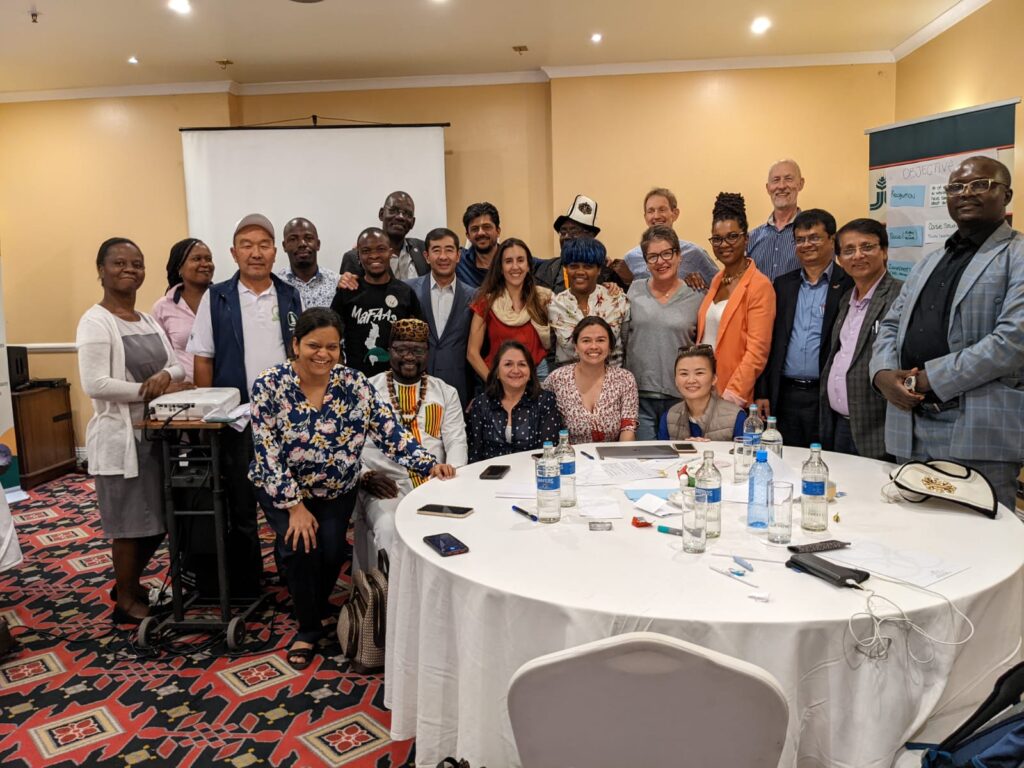
IFAD supervision mission was organised at Nairobi, Kenya, during 28 September – 1 October 2022 in the framework of the Last Mile Project (LMP) by IFAD and GFRAS to assess the achievements and progress in project implementation and setting out the course of rest of the project. The participants ranged from representatives of the IFAD from its Headquarters in Rome, representatives of the targeted GFRAS country platforms (Country Fora -CF), as well as representatives of GFRAS regional Networks and Global Secretariat.
Strengthening Capacities of Agricultural Research and Extension Organizations to Support Agriculture Innovation in Asia-Pacific –21 June 2022
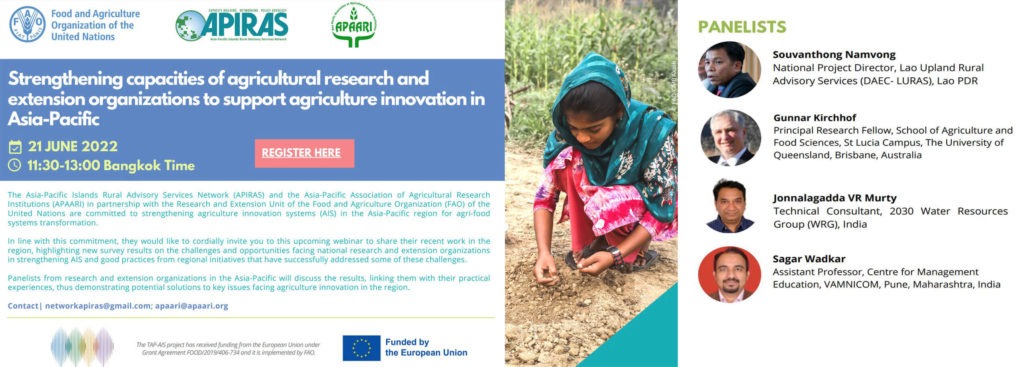
This webinar was organized to share the results from the online survey on “Strengthening Agricultural Innovation Systems (AIS) in Asia-Pacific: Research-Extension Interface” and to showcase good practices from the region that have successfully addressed some of these challenges in strengthening AIS.
Panelists from research and extension organizations in the Asia-Pacific discussed their practical experiences thus demonstrating potential solutions to key issues facing agriculture innovation in the region.
APIRAS-APAARI-FAO Working Group on Agroecology
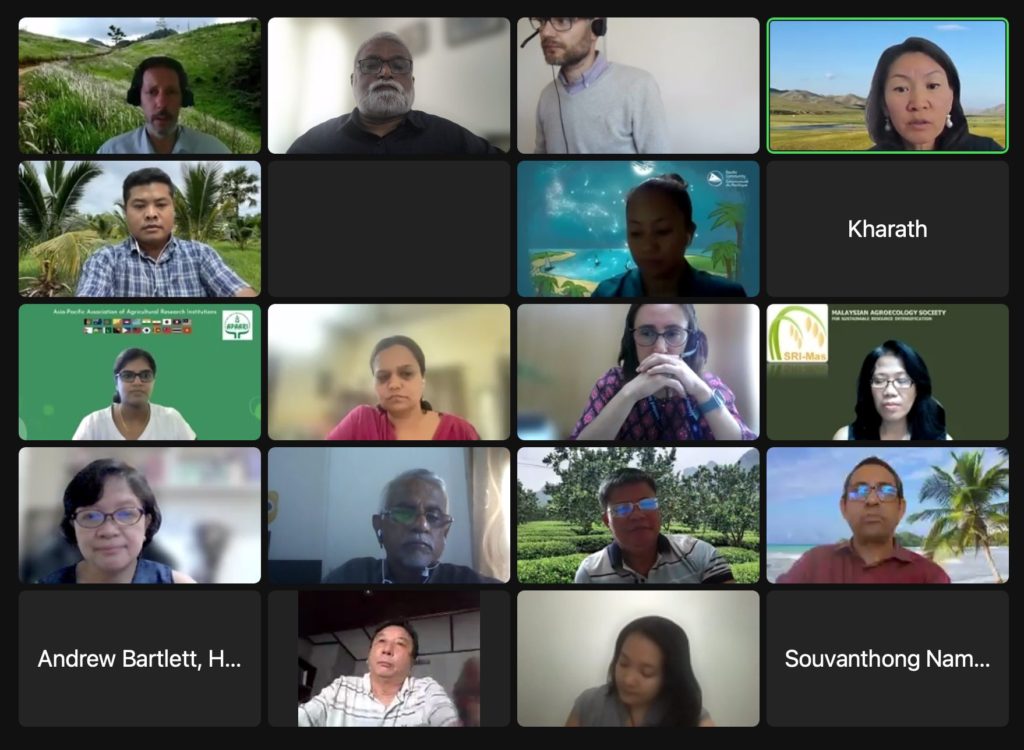
First Meeting of the APIRAS-APAARI-FAO Working Group on Agroecology (10 June 2022)
In this first meeting, the working group focussed on the challenges in mainstreaming agroecology in the research, extension and education agencies in Asia-Pacific and ways of strengthening these capacities to promote agroecology which could then be supported by both Regional Research and Extension Organizations in Asia-Pacific (APAARI and APIRAS).
Click on the link below to access the short summary of the event.
First Meeting of the Working Group on Agri-biotechnology- APAARI-APIRAS-FAO (TAP-AIS)
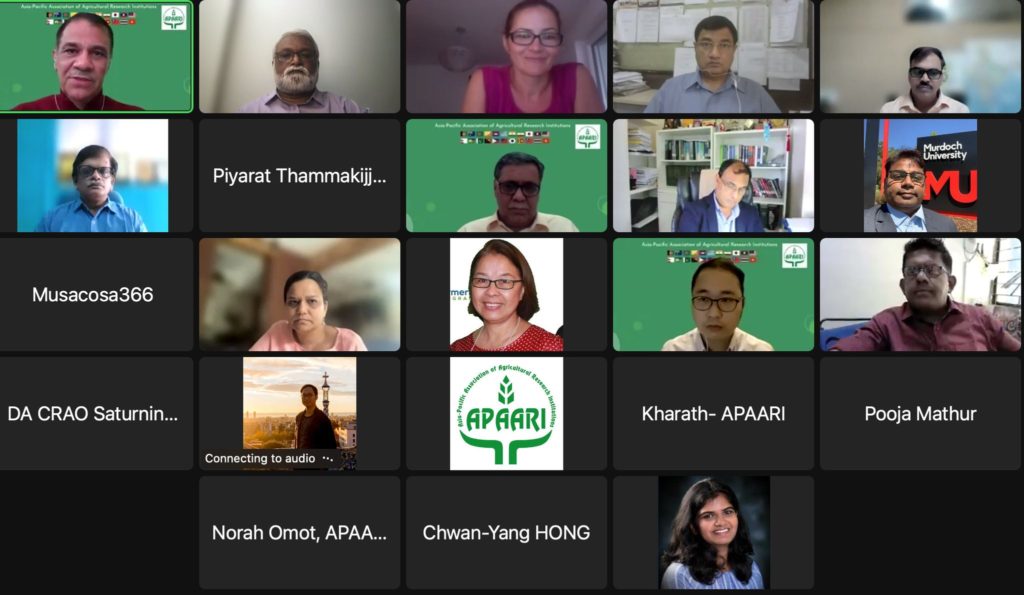
The first and second meeting of the Working Group on Agri-biotechnology was held on 25 May 2022 and 17 June 2022 respectively.
These meeting were held to:
- Discuss main challenges and opportunities biotechnology presents to small holders in Asia and Pacific;
- Provide strategic guidance on the use of biotechnology for small holder farmers in the region; and
- Contribute to the development of regional brief on biotechnology for small holders in Asia: status and outlook.
Webinar on Women in Research and Extension: Advancing Gender Equality in Innovation in Asia-Pacific
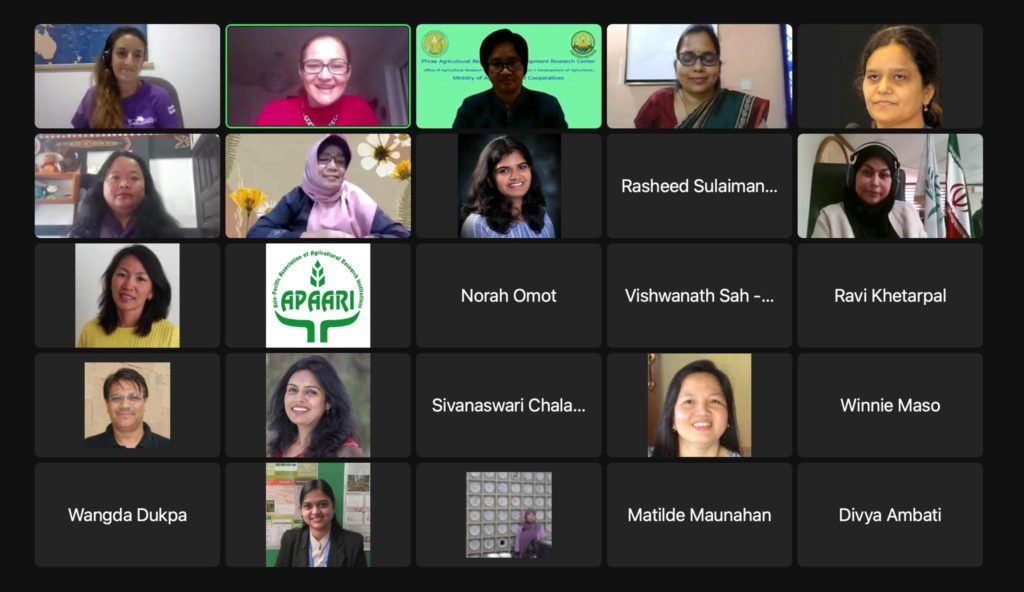
08 march 2022, The Asia-Pacific Association of Agricultural Research Institutions (APAARI), in collaboration with the Asia-Pacific Islands Rural Advisory Services Network (APIRAS), and the Tropical Agriculture Platform (TAP) hosted by the Food and Agriculture Organization of the United Nations (FAO), organizied a webinar on ‘Women in research and extension: Advancing gender equality in innovation’.
The webinar was aimed to inspire and mobilize change to help advance women’s role as innovators in their respective areas of research and extension, to ensure their meaningful and inclusive contribution to the transformation of agri-food systems in the Asia-Pacific region.
Training for Rural Youth Lead Farmers -07 to 08 January 2022.
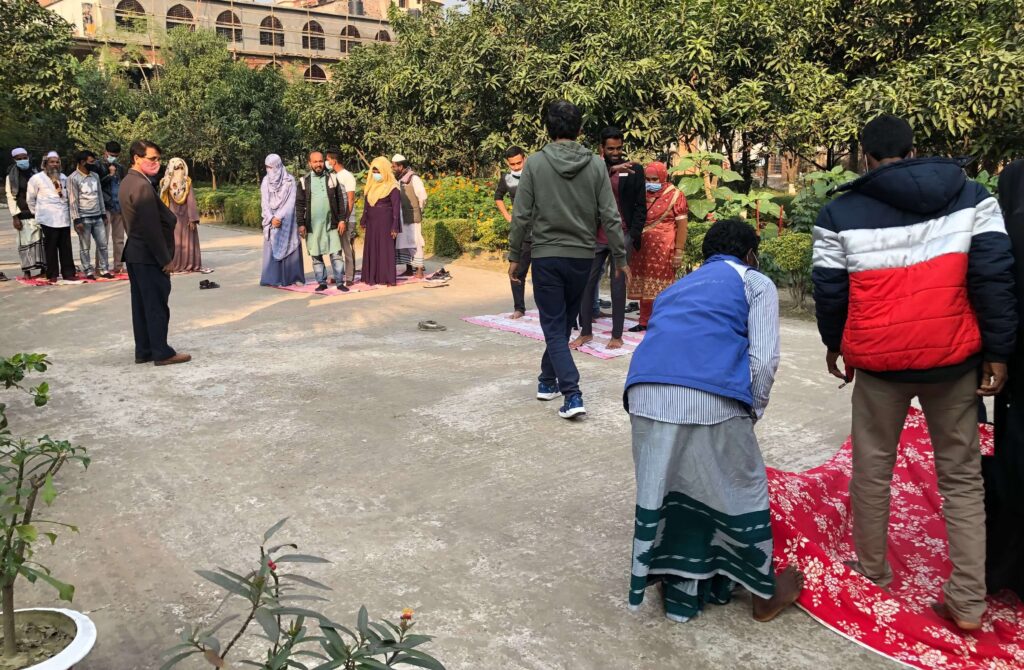
Bangladesh Agricultural Extension Network (BAEN), under the IFAD-funded Last Mile Programme (LMP), co-organized a ‘Leadership training for rural youth lead farmers’ from 07 to 08 January 2022, in collaboration with Palli Karma Sahayak Foundation (PKSF). It was a two-day residential training where 21 trainees from five NGO partner organization of PKSF participated.
APIRAS-APAARI: CALL FOR GOOD PRACTICES Strengthening Agricultural Innovation Systems in Asia Pacific – 25 December 2021
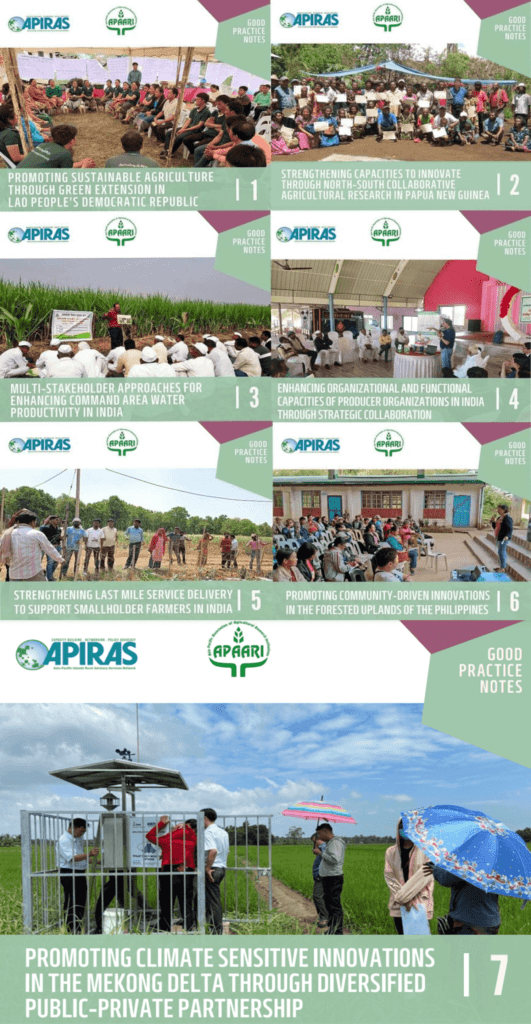
The Asia-Pacific Islands and Rural Advisory Services Network (APIRAS), the Asia-Pacific Association of Agricultural Research Institutions (APAARI) in close collaboration with the Research and Extension Unit of the Food and Agriculture Organization (FAO) of the United Nations are committed to strengthen agriculture innovation systems in Asia-Pacific for transforming agri-food systems. In 2020, APIRAS and APAARI carried out Joint Rapid Appraisal (JRA) to scope the innovation environment to identify and document initiatives aimed at strengthening Agricultural Innovation Systems (AIS). The JRA revealed three main barriers that constrain development of an effective AIS in the Asia-Pacific.
These include:
a. lack of sufficient partnerships among actors in the AIS,
b. inadequate investments and lack of policies that could steer the research and extension agencies to engage with other AIS actors, and
c. lack of sufficient capacity development initiatives aimed at enhancing functional capacities of AIS actors.
This call is to document good practices that have contributed to successful strengthening of capacities for innovation drawing on experiences on the above three topics.
We selected 7 such good practice notes and the links to these are given below.
1.https://apiras.net/publications/promoting-sustainable-agriculture-through-green-extension-in-lao-peoples-democratic-republic/
2.https://apiras.net/publications/strengthening-capacities-to-innovate-through-north-south-collaborative-agricultural-research-in-papua-new-guinea/
3.https://apiras.net/publications/multi-stakeholder-approaches-for-enhancing-command-area-water-productivity-in-india/
4.https://apiras.net/publications/enhancing-organisational-and-functional-capacities-of-producer-organisations-in-india-through-strategic-collaboration/
5.https://apiras.net/publications/strengthening-last-mile-service-delivery-to-support-smallholder-farmers-in-india/
6.https://apiras.net/publications/promoting-community-driven-innovations-in-the-forested-uplands-of-the-philippines/
7. https://apiras.net/publications/promoting-climate-sensitive-innovations-in-the-mekong-delta-through-diversified-public-private-partnership/
Joint Rapid Appraisal on Strengthening Agricultural Innovation Systems in Asia-Pacific 10-Decmeber 2022
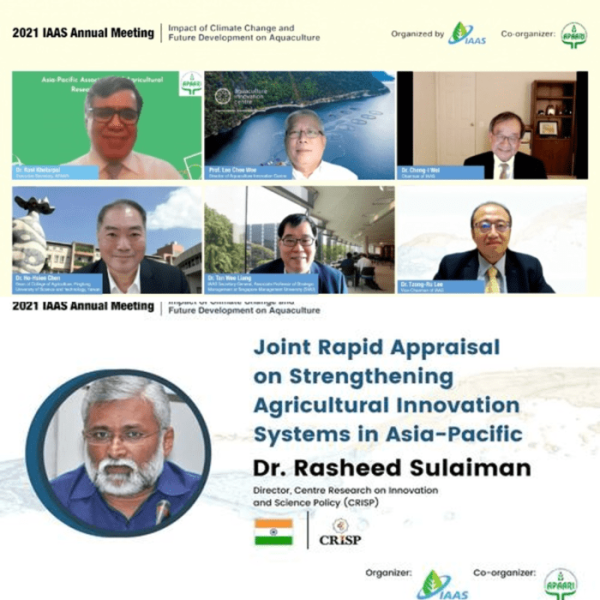
10th December 2021, International Association for Agriculture Sustainability (IAAS) organized its Annual Meeting that gathered more than 300 scholars, researchers, industry professionals and investors from 47 countries to discuss the challenges by climate change and share the solutions from different region’s respectively. During this event, Dr. Rasheed Sulaiman V, Director Centre for Research on Innovation and Science Policy (CRISP) and Focal Point APIRAS made a presentation on the Joint Rapid Appraisal on Strengthening AIS in Asia-Pacific.
The presentation can be accessed from the link below:
Training of Trainers Workshop on ‘Strengthening Agriculture Innovation Systems in Asia-Pacific: TAP Approaches and Tools’ held on 19-20 October 2021,
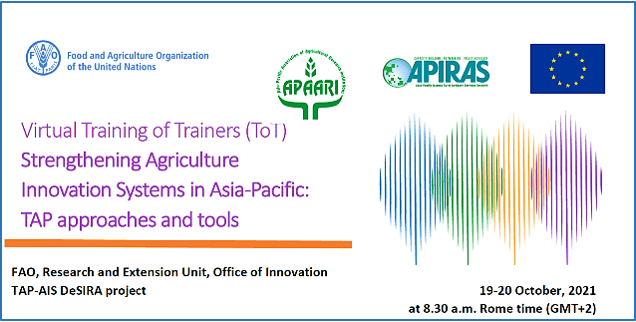
The training was organized by the Tropical Agriculture Platform – Agricultural Innovation Systems (TAP-AIS) project, ‘Developing Capacities in Agricultural Innovation Systems: Scaling up the Tropical Agriculture Platform Framework’, implemented by FAO’s Research & Extension (R&E) Unit, funded by the European Union (EU) as a component of the ‘Development Smart Innovation through Research in Agriculture (DeSIRA): Towards Climate-relevant Agricultural and Knowledge Innovation Systems’ initiative. The project aims to strengthen AIS by promoting the Common Framework for capacity development of the TAP.
Thirty participants from 13 countries in Asia and the Pacific – Bangladesh, Bhutan, Cambodia, Kyrgyzstan, India, Indonesia, Lao People’s Democratic Republic, Malaysia, Nepal, Philippines, Sri Lanka, Thailand and Viet Nam – joined the webinar.
Dialogue on Public-Private Partnership Policy and its role in Agricultural Extension- 25 September 2021
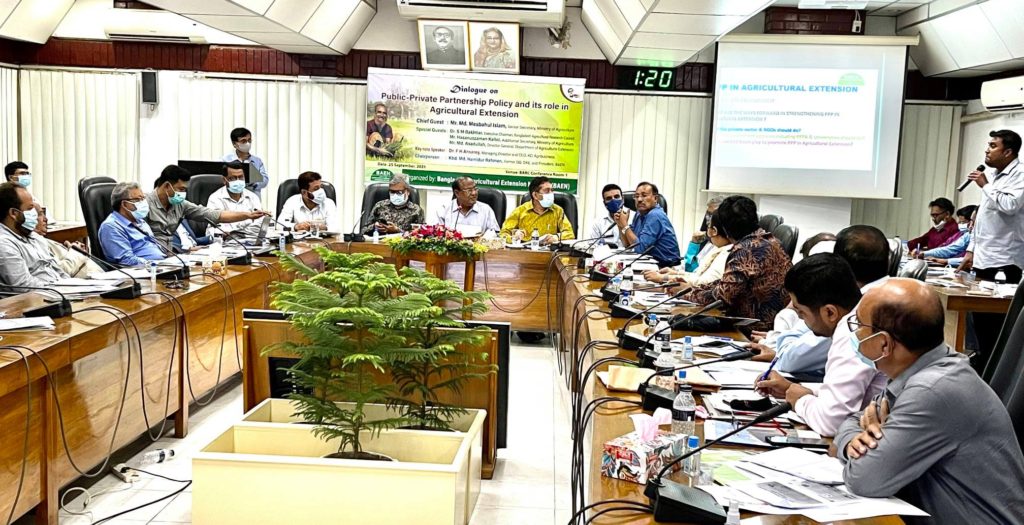
Bangladesh Agricultural Extension Network (BAEN) under the IFAD-funded Last Mile Programme (LMP), organized a Dialogue on ‘Public-Private Partnership (PPP) Policy and its role in Agricultural Extension’ on 25 September 2021, at Dhaka, Bangladesh. It discussed the draft findings from the recent analysis conducted by BAEN on PPPs in Agricultural Extension in Bangladesh and charted potential ways forward for strengthening PPP initiatives to reach farmers at the last mile with advice and services.
APIRAS participated in the TAP side event
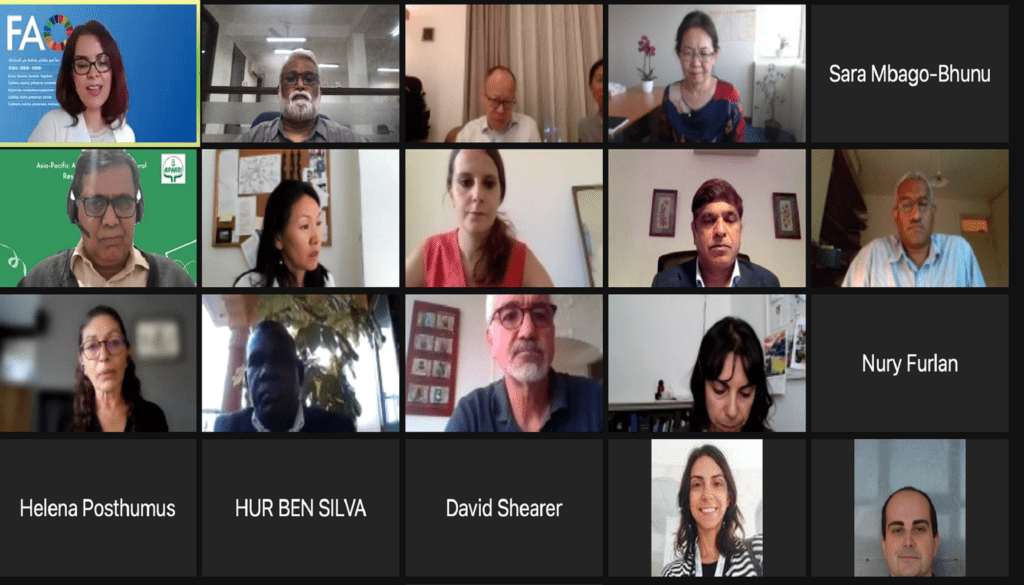
APIRAS participated in the TAP side event on Capacity Development for Agricultural Innovation Systems-lessons learnt and future action of the TAP partnership on 5 July 2021 as part of the science days of the UN Food Systems Summit 2021. Regional Research and Extension Organizations including APIRAS highlighted their efforts to integrate TAP tools and approaches into their work and shared some lessons learnt through their collaboration in the context of the TAP-AIS project.
AESA STRATEGIC PLAN-2021-26
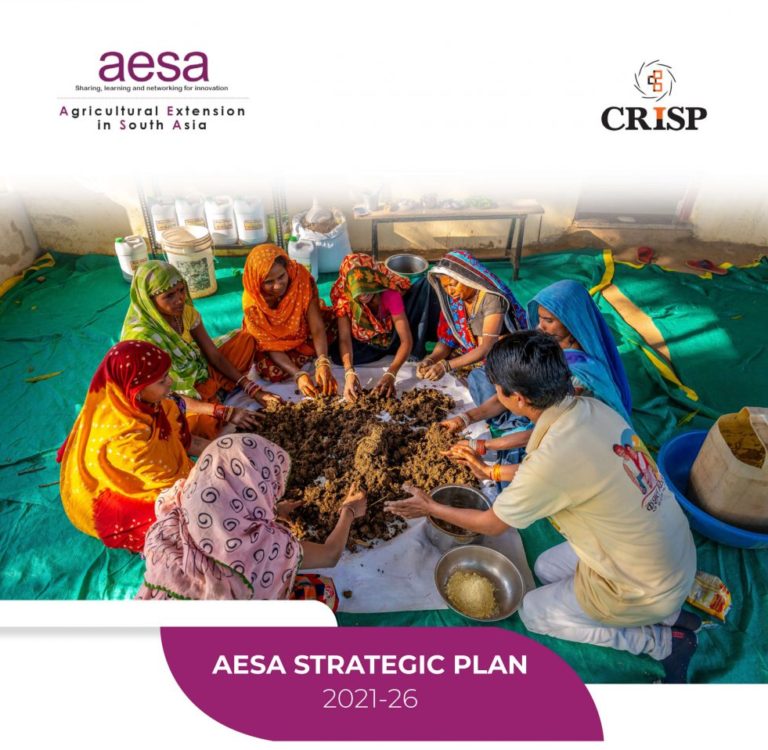
Reviewing short- and medium-term priorities and results framework and develop strategic Plan-AESA 2025.
It was only seven years back, in 2014 that AESA (Agricultural Extension in South Asia) started its journey in Asia. Despite the funds limitation AESA has performed extremely well, though it could have probably done much more if it had adequate funds. This has happened primarily because of the dedication of its founding members to keep moving against all odds. Today AESA is very well-known within the agriculture extension fraternity. Its knowledge management products are highly appreciated. AESA’s founding members strongly feel that the time has now come to take a leap and achieve much more – systematically and sustainably. These founding members strongly feel that the priorities that were identified in 2014 are extremely good and are valid even today. Taking these priorities into the next six years, AESA needs to consolidate what it does well and find ways to achieve what it hasn’t been able to achieve yet. Analyzing the current status of the priorities, strength and weakness of AESA, in the next five years AESA will focus on the following strategic directions:
- Consolidating knowledge management;
- Strengthening capacity building;
- Increasing members and followers;
- Establishing remaining country forums;
- Institutionalizing AESA;
- Enhancing resource mobilization; and
- Continuing with its global contributions on extension and advisory services.
Last Mile Programme (LMP) 2-5 December 2020.
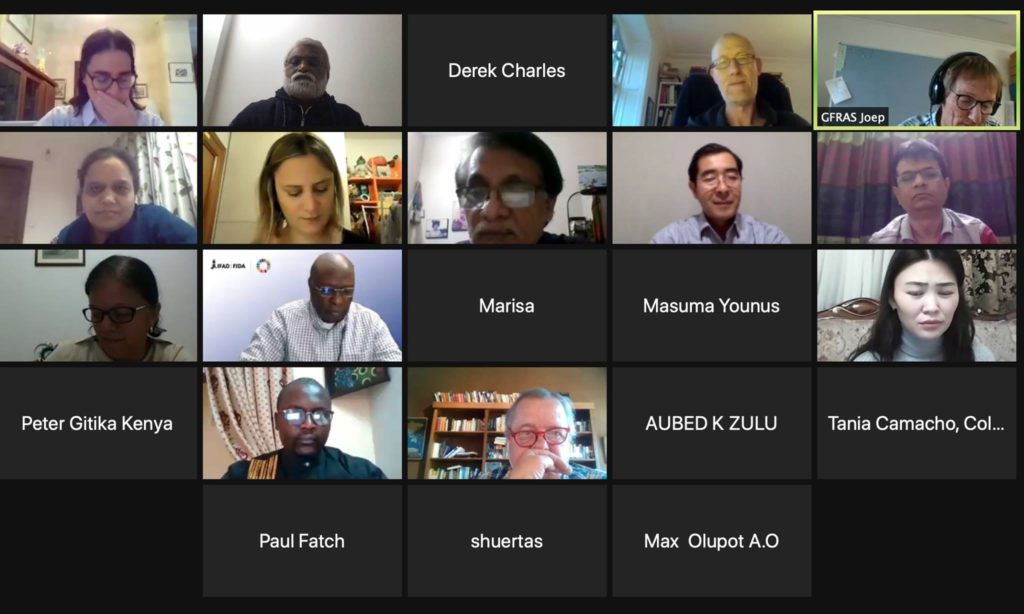
The APIRAS team also Participated in the Virtual Supervision Mission of the Last Mile Programme (LMP) During 2-5 December 2020.
GOOD PRACTICES: Public Private Partnerships in Extension and Advisory Services
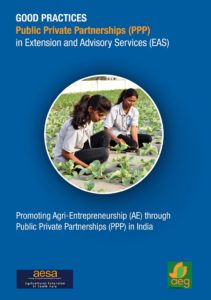
AESA, through its website, published a Good Practices on Public Private Partnerships (PPP) in EAS.
In this Good Practices Note, S Baskar Reddy, Rajendra Jog, Parikrama Chowdhry and Aravind Thumbur reflect on their experiences here.
Please click the Links Below:
https://www.aesanetwork.org/good-practices-public-private-partnerships-in-extension-and-advisory-services/
https://www.aesanetwork.org/pubic-private-partnership-in-fodder-seed-production/
National Workshop on Advanced Research Methodology for Social Sciences

Networking undertaking partnership activities and initiating support for RAS capacity development, professionalization and RAS innovation.
AESA co-organized a national workshop on ‘Advanced Research Methodology for Social Sciences’ from 6 to 11 January 2020 at ICAR Research Complex for North Eastern Hill Region (ICAR-RC-NEH), Umiam, Meghalaya. This was done in collaboration with National Institute of Agricultural Extension Management (MANAGE), ICAR-Central Tuber Crops Research Institute (ICAR-CTCRI), Centre for Research on Innovation and Science Policy (CRISP) and ICAR-RC-NEH.
APIRAS-APAARI Joint Action Plan
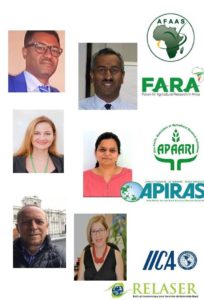
In order to integrate TAP tools into the research and extension organizations and their programmes in the Asia-Pacific region, a joint rapid appraisal ( http://www.fao.org/3/cb5995en/cb5995en.pdf) was conducted by regional research and extension organizations (APAARI and APIRAS) in 2020, resulting in a Joint Action Plan (JAP). The APAARI-APIRAS rapid appraisal allowed to identify entry points for the uptake of TAP approaches and tools: consequently, the JAP includes specific activities to promote TAP concepts and approaches on CD for AIS in the Asia-Pacific region.
APIRAS participated in the Regional Dialogue on ‘Capacity Development in Agricultural Innovation Systems (CDAIS) in Asia, Africa and Latin America: Lessons and Experiences from the Joint Rapid Appraisals (JRA)’ on 20 November 2020 and presented the findings from South Asia. This event was co-organized by the Inter-American Institute for Cooperation on Agriculture (IICA), the Latin American Rural Extension Services Network (RELASER), the Asia-Pacific Association of Agricultural Research Institutions (APAARI), the APIRAS, the Forum for Agricultural Research in Africa (FARA), and the African Forum for Agricultural Advisory Services (AFAAS) as a side event at the TAP Partner Assembly.
